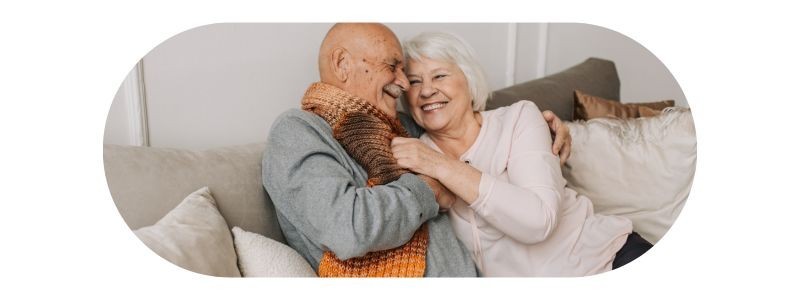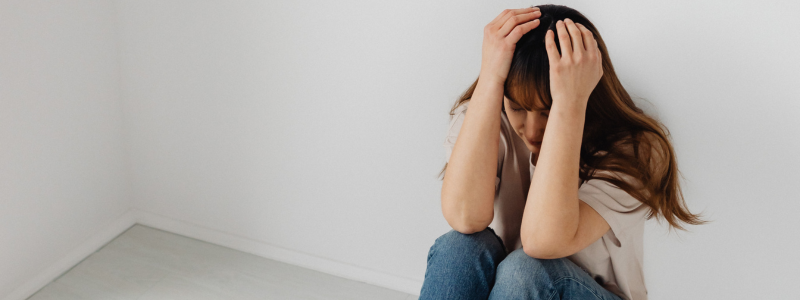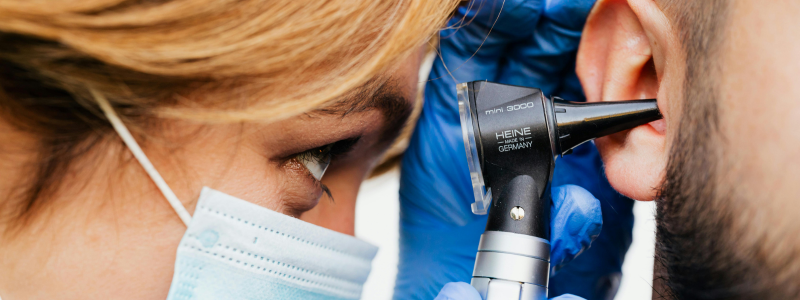
Head of Online Medical Content

Audiology Expert

Hearing Aids for the Over 80s
It's never too late
Overview | Am I too old? | The safety factor | The cognitive benefits | The home visit advantage | Conclusion
Last Hearing Aid UK Update: 23/02/2026
Overview
If you're in your 80s and considering hearing aids for the first time, you might be wondering if it's worth it. Perhaps you've been told "it's just your age", or you're thinking "I've managed this long without them."
However, you deserve to hear properly, regardless of your age. And the difference hearing aids can make to your daily life, safety, and connections with family might surprise you.
Am I too old for hearing aids?
We hear this question remarkably often from people in their 80s and beyond, and the answer is always the same: absolutely not. We regularly fit hearing aids for people in their 80s and 90s, and the feedback is overwhelmingly positive once they adjust.
Bottom line is that you shouldn't be struggling to hear your grandchildren, missing conversations with friends, or feeling isolated because communication has become too difficult.
Related reading: Communication strategies for those with hearing loss
What changes after 80
Hearing loss in your 80s often differs from hearing loss in younger people. By this age, many people have significant hearing loss across multiple frequencies, not just the high-pitched sounds that typically go first.
This means conversations might sound very muffled or distant, and you might find yourself avoiding social situations entirely because they're simply too exhausting.
You might also notice:
- Difficulty hearing the telephone or doorbell
- Missing alarm sounds or safety alerts
- Struggling to hear the television even at high volumes
- Finding it hard to follow conversations when multiple people are talking
- Feeling isolated or left out at family gatherings
- Increased anxiety about going out because you can't hear traffic or announcements
These aren't just inconveniences but safety issues and quality of life concerns that hearing aids can genuinely address.
The safety factor
At 80 and beyond, hearing properly isn't just about social connection; it's also about safety. Being able to hear smoke alarms, doorbells, traffic, and people approaching from behind matters enormously.
Hearing aids can restore your awareness of your acoustic environment, which helps you stay safe and independent.
Many of our older clients report feeling more confident going out once they can hear properly again. They notice cars approaching, hear people trying to get their attention, and can respond appropriately when someone speaks to them in shops or on the street.
I'm not good with technology
This is perhaps the most common concern we hear from people in their 80s, and it's completely understandable. The good news is that modern hearing aids don't require you to be technically minded. In fact, the latest models are designed to do most of the work automatically.
You don't need a smartphone to use hearing aids, and you don't need to understand apps or Bluetooth. Basic hearing aids simply go in your ears, turn on automatically, and adjust to different environments without you doing anything.
Related reading: Hearing aids with Bluetooth
The cognitive benefits
Research increasingly shows that treating hearing loss in older age has cognitive benefits. Even in your 80s, hearing aids can help slow cognitive decline by keeping your brain actively engaged in processing sound and conversation.
When you can't hear properly, your brain works overtime trying to fill in the gaps, which is simply mentally exhausting.
This cognitive load reduces your capacity for other mental tasks. Hearing aids reduce this strain, leaving more mental energy for memory, problem-solving, and staying engaged with the world around you.
Several studies have shown that older adults who use hearing aids have better cognitive function than those with similar hearing loss who don't use them. The reality is that it's never too late for your brain to benefit from proper auditory input.
Staying connected to family
One of the most common things we hear from family members is "Mum/Dad has just withdrawn" or "Grandma doesn't join in conversations anymore."
Often, this isn't because they don't want to participate, but because following conversation has become too difficult and exhausting.
Hearing aids can transform family gatherings, and being able to hear your grandchildren properly, follow conversations around the dinner table, and stay involved in family life makes an enormous difference to wellbeing and quality of life.
Many families report that their elderly relative becomes more like their old self once they're fitted with hearing aids. They are genuinely more engaged, more cheerful, and more willing to participate in activities and outings.
NHS or private?
You're also entitled to free hearing aids through the NHS, and these are perfectly good hearing aids that help many people, and they're certainly worth considering if budget is a concern.
However, NHS hearing aids typically: use disposable batteries (fiddly to change), have fewer adjustment options, offer more limited noise reduction compared to premium private options, come with limited follow-up support, and naturally have longer waiting times for appointments and adjustments.
On the other hand, private hearing aids offer: rechargeable options (much easier), more sophisticated sound processing, better performance in difficult listening situations, ongoing support and adjustments included, home visits if getting to appointments is difficult, and typically, better cosmetic options.
For many people in their 80s, the rechargeable aspect alone makes private hearing aids worthwhile. Not having to change tiny batteries every few days removes a significant barrier, especially if you have arthritis or reduced dexterity.
The home visit advantage
Getting to appointments can be challenging in your 80s, particularly if you don't drive or if mobility is limited, and this is where home visits become genuinely valuable rather than just convenient.
We can conduct the entire process at home, such as a complete hearing assessment, ear impressions, if needed, for custom moulds, demonstration of different hearing aid options, fitting and programming, follow-up adjustments, and ongoing support and maintenance
Being in your own home also means we can assess your specific listening environments, such as your television, your telephone, and your living room, where you usually talk to visitors. This helps us programme your hearing aids for the situations that actually matter to you.
What to expect
It's important to know that hearing aids take some getting used to, and this adjustment period might take a bit longer in your 80s simply because your brain hasn't processed certain sounds properly for many years.
Everything might sound quite loud or sharp at first, and you'll also hear sounds you'd forgotten existed, such as the rustle of newspaper, birds singing, water running, and your own footsteps. This is normal, and your brain will adapt, usually within a few weeks.
The key is wearing the hearing aids consistently. People who wear them for a few hours and then take them off because "everything sounds strange" take much longer to adjust than those who commit to wearing them all day from the start.
It is quite common for an audiologist to programme hearing aids gradually for older clients, building up the amplification over several appointments rather than giving the full correction immediately. This gentler approach usually helps patients adapt more comfortably.
When hearing loss is severe
If you've left hearing loss untreated for many years, you might have quite severe loss by your 80s. The good news is that modern hearing aids can accommodate even profound hearing loss, though it's worth being realistic about expectations.
Your brain needs time to relearn how to process speech sounds, and some sounds might never be as clear as they were years ago. However, the improvement will almost certainly be significant and worthwhile.
Cost considerations
We understand that cost is a huge consideration, and that hearing aids are an investment, with prices typically starting from £795 per ear, depending on the technology level.
However, consider that: good hearing aids last 5-7 years with proper care, the daily cost works out to pennies when spread over their lifespan, most private providers offer payment plans, the improvement in the quality of life is often described as priceless by users, and NHS hearing aids are free if the budget is a genuine barrier.
We never pressure anyone into the most expensive option. We'll recommend hearing aids based on your actual hearing loss, listening situations, and budget, and we'll be honest about whether NHS hearing aids would meet your needs adequately.
I know someone whose hearing aids didn't help them
We hear this concern regularly, and it usually comes down to one of three things:
- Poor fitting – hearing aids only work properly when they're correctly programmed for your specific hearing loss. Many people get hearing aids that aren't adjusted properly and assume all hearing aids are like that.
- Wrong expectations – if someone expected hearing aids to restore perfect hearing, they were bound to be disappointed.
- Didn't persist through adjustment – people who give up after a few days because everything sounds different never give their brain a chance to adapt.
With proper fitting, realistic expectations, and commitment to wearing them, the vast majority of people benefit significantly from hearing aids, and the success rate is very high when these factors are in place.
Taking the first step
If you're in your 80s and thinking about hearing aids, the first step is simply getting your hearing tested. A comprehensive assessment will show exactly what you can and cannot hear, and whether hearing aids would help.
There's no pressure to buy anything, and sometimes we discover that hearing is actually better than expected, or that there's a medical issue that needs addressing before hearing aids would help.
If hearing aids would help, you can try them with our 60-day money-back guarantee. That's plenty of time to adjust to them and decide if they're genuinely improving your life.
Conclusion
The most important thing to remember is that you're not too old for hearing aids. You have the right to hear your family clearly, stay safe and independent, and stay in touch with the world around you. Age doesn't mean you have to accept hearing loss as something that can't be fixed.
Hearing aids can make a big difference in the quality of life for people in their 80s and beyond. Hearing well affects everything, from your confidence and safety to your relationships, mental sharpness, and overall health.
Why Choose Us?
- FREE Hearing Tests
- Best Hearing Aids and Prices
- FREE Aftercare for Life
- FREE Home Visits
- 200+ Local Audiologists
- 60 Day Money Back Guarantee
Ready to explore your options?
We offer free hearing assessments at home across the UK – no need to travel to a clinic. We'll test your hearing, explain what the results mean, and discuss whether hearing aids might help.
Everything is done at your pace, with no technical jargon and no pressure. If you have family members who'd like to be involved in the decision, they're welcome to join the appointment.
Your age isn't a reason to miss out on conversations with grandchildren, struggle to hear the television, or feel isolated. You're not too old for hearing aids - you're exactly the right age to start hearing properly again.
Other hearing loss awareness articles you might like...
 Hearing aid stigma
Hearing aid stigma  How to tell if hearing loss is permanent or temporary
How to tell if hearing loss is permanent or temporary  Ways to keep your ears healthy
Ways to keep your ears healthy Our specialist service includes:
Do not spend hundreds of pounds without getting a second opinion from us.
Please call us on 0800 567 7621
 Not only are the prices great, but the service is fantastic! Many thanks to your team.
Not only are the prices great, but the service is fantastic! Many thanks to your team.What's included in our hearing aid prices?
Common FAQs about hearing aids and hearing loss
In general, any audiologist will always recommend to you the hearing aid model that best suits your needs. Here is a useful checklist to make sure that is the case.
- Audiologist's level of knowledge: The audiologist you have seen will hopefully have a wide knowledge of all available hearing aids; however, some will only be familiar with a small number of brands and, therefore, may not really be in a position to know which model is the best for you. It is OK to challenge their recommendation and ask them to justify why this particular brand is the one for you.
- Do research: Read about the hearing aid that was recommended. Does it seem like it will suit your lifestyle? Does it have more or fewer features than you need?
- Be aware of sales targets: Many high street retailers have specific tie-ins to a particular manufacturer/brand. The hearing aid they have suggested may still be the correct one for you, but do your research so that you know why they might have recommended it.
If you have significant hearing loss in both ears, you should be wearing two hearing aids. Here are the audiological reasons why:
Localisation: The brain decodes information from both ears and compares and contrasts them. By analysing the minuscule time delays as well as the difference in the loudness of each sound reaching the ears, the person is able to accurately locate a sound source.
Simply put, if you have better hearing on one side than the other, you can't accurately tell what direction sounds are coming from.
Less amplification is required: A phenomenon known as “binaural summation” means that the hearing aids can be set at a lower and more natural volume setting than if you wore only one hearing aid.
Head shadow effect: High frequencies, the part of your hearing that gives clarity and meaning to speech sounds, cannot bend around your head. Only low frequencies can. Therefore, if someone is talking on your unaided side, you are likely to hear that they are speaking, but be unable to tell what they have said.
Noise reduction: The brain has its own built-in noise reduction, which is only really effective when it is receiving information from both ears. If only one ear is aided, even with the best hearing aid in the world, it will be difficult for you to hear in background noise as your brain is trying to retain all of the sounds (including background noise) rather than filtering them out.
Sound quality: We are designed to hear in stereo. Only hearing from one side sounds a lot less natural to us.
Fancy some further reading on this topic? You can read about why two hearing aids are better than one in our article, hearing aids for Both Ears, here
For most people, the main benefit of a rechargeable hearing aid is simple convenience. We are used to plugging in our phones and other devices overnight for them to charge up. Here are some other pros and cons:
For anybody with poor dexterity or issues with their fingers, having a rechargeable aid makes a huge difference, as normal hearing aid batteries are quite small and some people find them fiddly to change.
One downside is that if you forget to charge your hearing aid, then it is a problem that can't be instantly fixed. For most, a 30-minute charge will get you at least two or three hours of hearing, but if you are the type of person who is likely to forget to plug them in regularly, then you're probably better off with standard batteries.
Rechargeable aids are also a little bit bigger and are only available in Behind-the-Ear models.
Finally, just like with a mobile phone, the amount of charge you get on day one is not going to be the same as you get a few years down the line. Be sure to ask what the policy is with the manufacturer's warranty when it comes to replacing the battery.
For most people, the answer is yes. But it's never that simple.
The majority of hearing problems affect the high frequencies a lot more than the low ones. Therefore, open fitting hearing aids sound a lot more natural and ones that block your ears up can make your own voice sound like you are talking with your head in a bucket. Therefore, in-ear aids tend to be less natural.
However, the true answer is we can't tell until we have had a look in your ears to assess the size of your ear canal, and until we have tested your hearing to see which frequencies are being affected.
People with wider ear canals tend to have more flexibility, also there are open fitting modular CIC hearing aids now that do not block your ears.
There is also the age-old rule to consider, that a hearing aid will not help you if it's sat in the drawer gathering dust. If the only hearing aid you would be happy wearing is one that people can't see, then that's what you should get.
Most people can adapt to any type of hearing aid, as long as they know what to expect. Have an honest conversation with your audiologist as to what your needs are.
Generally speaking, six or more. Unless it's none at all. The number of channels a hearing aid has is often a simplistic way an audiologist will use to explain why one hearing aid is better than another, but channels are complex, and it is really not that straightforward. Here are some reasons why:
Hearing aids amplify sounds of different frequencies by different amounts. Most people have lost more high frequencies than low, and therefore need more amplification in the high frequencies. The range of sounds you hear is split into frequency bands or channels, and the hearing aids are set to provide the right amount of hearing at each frequency level.
Less than six channels, and this cannot be done with much accuracy, so six is the magic number. However, a six-channel aid is typically very basic with few other features and is suitable only for hearing a single speaker in a quiet room. The number of channels is not what you should be looking at; it's more the rest of the technology that comes with them.
As a final note, different manufacturers have different approaches. One method is not necessarily better than any other. For example, some manufacturers have as many as 64 channels in their top aids. Most tend to have between 17 and 20. One manufacturer has no channels at all.
Manufacturer's warranties typically last between 2-5 years, depending on the brand and model, and cover defects in materials and workmanship. This includes repairs for component failures, electronic malfunctions, and manufacturing defects, but excludes damage from misuse, accidents, or normal wear. Most manufacturers also include loss and damage insurance for the first year.
We handle all warranty claims on your behalf, liaising with manufacturers and ensuring you get replacement devices quickly when needed. This comprehensive warranty coverage, combined with our lifetime aftercare, gives you complete peace of mind.
Our hearing tests are completely free, whether at our clinics or in your home. Unlike other providers who charge £30-£100 for home visits, we believe hearing healthcare should be accessible without financial barriers. Our comprehensive assessments include examination by a registered audiologist, audiogram results, and personalised recommendations.
All testing, future adjustments, and ongoing support are included at no extra cost. While NHS tests are also free, typical 6-week waiting periods often lead people to seek immediate private testing. We provide prompt, professional assessments that fit your schedule and budget.
Yes, we offer completely free home visits throughout the UK, and this service is included in our prices with no additional charges. Home visits are particularly valuable for people with mobility issues, busy schedules, or those who simply prefer the comfort and convenience of their own environment.
Our audiologists can conduct full hearing tests, fit hearing aids, and provide ongoing support in your home. This service sets us apart from many providers who either don't offer home visits or charge extra for them.
We can offer prices up to 40% lower than high street retailers because of our business model. As a network of 200+ independent audiologists, we don't have the massive overheads of large retail chains - no expensive high street premises, no sales targets pushing audiologists to sell the most expensive options, and no costly marketing campaigns.
However, we maintain the same buying power as the big chains because we purchase on behalf of our entire nationwide network. This means you get access to the same premium hearing aids with professional service, but at genuinely competitive prices.
We offer a comprehensive 60-day money-back guarantee, which gives you twice the industry standard time to properly assess whether your hearing aids are right for you. This extended period recognises that adjusting to hearing aids takes time, and your brain needs several weeks to adapt to the amplified sounds.
Unlike many providers who offer just 30 days, we believe 60 days gives you the confidence to test your hearing aids in all the situations that matter to you - from quiet conversations at home to busy restaurants and outdoor activities.
Other pages you might find useful
Ask the Experts
6 Morton Lane
Walkwood
Redditch
Worcestershire
B97 5QA
Latest Launch
When we refer to a product as 'Latest Launch', we mean it is the latest to be released on the market.
New
When we refer to a product as 'New', we mean that the product is the newest hearing aid model on the market.
When we refer to a product as 'Superseded', we mean that there is a newer range available which replaces and improves on this product.
Older Model
When we refer to a product as an 'Older Model', we mean that it is has been superseded by at least two more recent hearing aid ranges.
